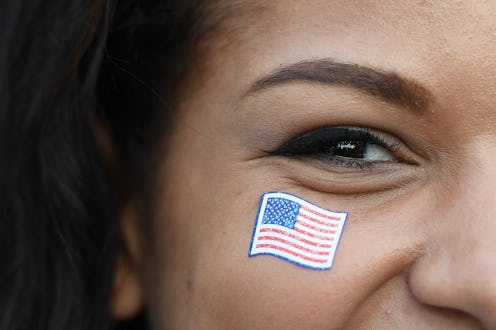News
Forget What You Know About Politics — Here’s How Women Will Switch It All Up In 2018

From the Women’s March to the #MeToo Movement, this year women drove monumental change. They organized in Facebook groups, on Twitter, and in protests across the country, redefining what activism looks like in the 21st century. Countless women came forward with personal stories of harassment that unveiled the systemic sexism of some of America’s most powerful institutions. Increased advocacy for equality also renewed conversations about the critiques of calls for solidarity, and who is credited when movements go mainstream. Time magazine named “The Silence Breakers” their person of the year, and Merriam-Webster named “feminism” the word of the year. But here’s the biggest story of all: The momentum from 2017 is showing no signs of stopping — many of these stories and their protagonists are just getting started.
Women Are Not Waiting To Run For Office
It’s not even 2018, and already an unprecedented number of women candidates are running for major office. According to the Center for American Women and Politics at Rutgers University, there are 589 potential women candidates for congressional or statewide office, and there could be more waiting in the wings. She Should Run, a nonpartisan organization dedicated to increasing women in public leadership, and EMILY's List, an organization dedicated to electing pro-choice Democratic women, have both reported tens of thousands of contacts since last November. (Some 15,000 contacted She Should Run, while 25,000 contacted Emily’s List.) Not all of these women will run, but they are further proof of an uptick in interest and enthusiasm among women.
"Will these women get the institutional support they need in order to win?"
Motivated by Trump’s election, his presidency, and the general direction of the country, women are expressing interest in running for office like never before, but that initial step is only one part of a long and arduous journey. She Should Run wants 250,000 women to be elected across the country by 2030, anticipating that gender parity between men and women will lead to laws that more evenly reflect the citizens they govern. Still, as filing deadlines approach, and then elections, larger questions loom about the gap between running and winning. Will these women get the institutional support they need in order to win? Will donors place their bets on women? Will the Democratic Party invest in minority women? And what can their races tell us about how the electorate will respond to women candidates in the lead up to 2020?
Democratic Women Could Challenge Trump In 2020
Looking toward the 2020 Presidential race, there are four female Democratic senators who are already being considered as likely candidates: Senators Kristen Gillibrand, Kamala Harris, Amy Klobuchar, and Elizabeth Warren. (Many analysts still put Senator Bernie Sanders and former Vice President Joe Biden at the top of their lists of potential Democratic nominees.) But others argue that this cultural moment is not to be underestimated — the #MeToo Movement’s upending of traditional power structures and a Democratic electorate closely aligned with cultural liberalism make the moment ripe for a woman to become the Democratic nominee.
Republican Women Are Also Making Moves
As rumblings of a “Republican shadow campaign” to replace or challenge Trump mount, Nikki Haley, the ambassador to the United Nations and former governor of South Carolina, is frequently mentioned as a would-be contender. In fact, Haley is one of three candidates the Democratic National Committee is reportedly preparing opposition research on, should she choose to run.
The race for president heats up in about 12 months, and pundits will be eyeing all of these women to see who takes the next steps towards formalizing a run. Once the question of if they’ll jump in is answered, there is the question of how they’ll run, which lessons they will take from Hillary Clinton’s 2016 campaign, and how a field potentially filled with women will shape the way we talk about gender and leadership in the run up to 2020.